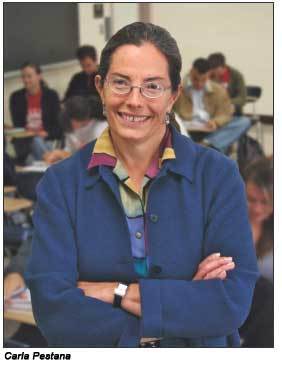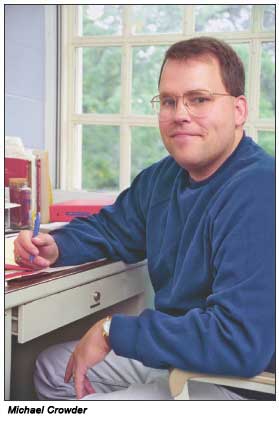|

By Vince Frieden

“The quality associated with a Miami
education rests fundamentally on our
ability to recruit, retain, and support
highly qualified faculty.”
President David Hodge
Among the work taking place in Michael Crowder’s Hughes Hall chemistry lab is a nine-year study of antibiotic resistance in bacteria that has received grants from the National Institutes of Health. The research by Crowder, the Ernest H. Volwiler Distinguished Research Professor in Chemistry, might soon yield a compound to halt that resistance and sustain the effectiveness of current antibiotics.
Just across Bishop Woods in Upham Hall, Carla Pestana, a published authority on English colonialism and the colonial United States, is nearing completion of her third book, The Politics of Religion in the British Atlantic World, 1530-1800. Pestana, the W.E. Smith Professor of History, is providing fresh historical perspectives on the ideas, personalities, and events that helped shape the New World.
Scenes like these unfold each day across Miami University’s campus, where professors on the forefront of their academic disciplines conduct significant research, contribute new insights, and share their leading-edge thinking and passion with their students in the classroom.
“Miami’s faculty is the university’s greatest resource,” President David Hodge said. “The quality associated with a Miami education rests fundamentally on our ability to recruit, retain, and support highly qualified faculty.”
| “Faculty who are active in research are engaged in thinking about history and producing material and ideas that enrich their teaching.” |
That’s why faculty support is a top priority of Miami’s Campaign For Love and Honor, leading Hodge to recently announce the need to triple the university’s endowed professorships. There are currently 39 such professorships at Miami that provide support for needs ranging from research expenses to student stipends. While each is arranged differently, every endowed professorship carries prestige and opportunity that can be effectively used to attract and retain talented faculty.
To support that objective, Hodge has launched a matching funds initiative aimed at creating 20 new professorships. While endowments for professorships typically require a minimum commitment of $400,000, the president has announced Miami will provide a $100,000 match for donors who commit at least $300,000.
 Crowder, who came to Miami as an assistant professor in 1995 because of the university’s dual emphasis on teaching and research, is in the second year of a three-year term as the Volwiler Professor. Crowder, who came to Miami as an assistant professor in 1995 because of the university’s dual emphasis on teaching and research, is in the second year of a three-year term as the Volwiler Professor.
“The professorship has given me more opportunities for community outreach, as well as exciting research and learning opportunities for undergraduate and graduate students in the lab,” he said. “It has provided me the flexibility to go in different directions as a teacher and researcher.”
Along with his study into antibiotic resistance in bacteria, Crowder and his students have begun a second study into how zinc is transferred within bacteria, which might one day lead to a new antibiotic. His professorship funds have supported that research as well as helping to underwrite a recent trip to Europe, where he presented invited lectures at two universities.
| “The professorship has given me more opportunities
for community outreach, as well as exciting
research and learning opportunities for students
in the lab.” |
Closer to home, Crowder has used his professorship to launch a partnership with Talawanda Elementary schools, culminating in the district’s first Science Week this past May. During the week, youngsters spent time on the Oxford campus learning about scientific fields and conducting experiments under the supervision of graduate and undergraduate students.
Pestana, previously an associate professor at Ohio State University, was “enticed” to campus in 2003 after being impressed by Miami’s history department, students, and overall sense of community. The W.E. Smith Professorship also influenced her decision.
“Once you’re appointed a professor, there aren’t a lot of opportunities for promotion, so the title of a named professorship is a nice honor,” she said. “The research money also is a big plus.”
Pestana views her professorship as a responsibility to her students, department, and profession. She uses the funds to support her research and to participate in conferences, which help her become a better teacher and resource for her students, she said.
“Faculty who are active in research are engaged in thinking about history and producing material and ideas that enrich their teaching,” Pestana said. “Being able to present ideas at conferences and debate with your colleagues translates well into a classroom, especially when you are working with Miami students, who can enter these conversations at a high intellectual level.”
Crowder’s Volwiler Professorship will be awarded to a new faculty member at the end of the 2007-08 academic year. He is grateful for its opportunities and appreciative of his department’s use of the professorship to inspire fresh thinking.
“In the application process, we were challenged to state how the professorship would benefit us, enhance our research, and allow the research group to go in new directions,” he said. “These types of changes and reinventions make our department more competitive not only in terms of funding and publishing, but also in attracting top students to work in our labs.”
Vince Frieden is a publications assistant in advancement services at Miami.
 Back to the Miamian Magazine Fall 2007 Web page Back to the Miamian Magazine Fall 2007 Web page
|



 Crowder, who came to Miami as an assistant professor in 1995 because of the university’s dual emphasis on teaching and research, is in the second year of a three-year term as the Volwiler Professor.
Crowder, who came to Miami as an assistant professor in 1995 because of the university’s dual emphasis on teaching and research, is in the second year of a three-year term as the Volwiler Professor.